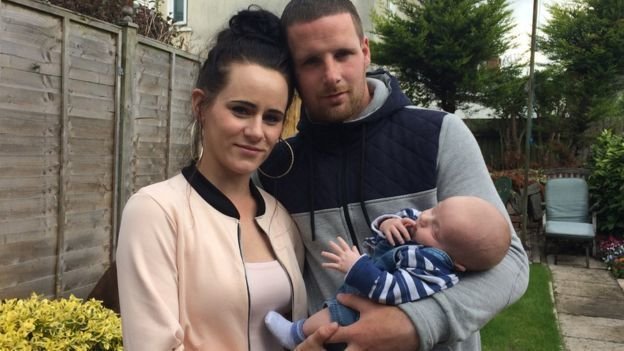More than 45,000 people have signed a petition calling for a dad’s jail sentence to be revoked after spending more than eight years in prison for a two-year-and-nine-month minimum term.
Shaun Lloyd, 31, from Cardiff, served three times his minimum term in prison after being jailed in 2006 for a street robbery.
He received an Imprisonment for Public Protection (IPP) sentence, which meant he could be held for as long as the Parole Board saw fit.
His release was conditional on him proving he no longer poses a serious risk to society.
Following years of campaigning led by his 59-year-old mum Shirley Debono, Shaun was released in 2014.
But he is back in HMP Cardiff again after being recalled in January this year in connection with a police investigation.
However emails seen by RightsInfo confirm that South Wales Police dropped the investigation in March due to lack of evidence.
‘It Is Dragging Him Down’

Image Credit: Shirley Debono
IPP prisoners can apply to have their sentence cancelled after 10 years in community. At least two prisoners have challenged this law in the courts, arguing it breaches their human right to private life.
Speaking to RightsInfo, Shirley is calling for the sentence to be revoked immediately – arguing it is preventing Shaun from rebuilding his life.
“It is dragging him down,” she said. “I am not saying he would be an angel.
“He shoplifted after he was placed on Universal Credit when he needed to get nappies for his daughter.
But she added: “He is not violent.”
Now Shaun desperately wants to rebuild his life.
Shirley Debono, Shaun Lloyd’s Mother
“If he was not going to probation every week he would be able to get on with his life.”
She said that he has a job lined up for him working at a family-owned builders merchants.
Shirley explained Shaun became depressed and addicted to drugs during his eight year stretch in jail.
“With no hope or light at the end of the tunnel, Shaun tried to hang himself,” she said.
She added that, after his initial release in 2014, he attempted to seek addiction help from probation officers to gain access to rehabilitation.
Instead he has been met with a lack of empathy, she claims, with Sean being recalled to prison in 2017 after testing positive for Class A drugs.
“These probation officers seem to think these people are like normal people,” she said.
“But it is hard to get rid of all the memories of prison.”
“They all get addicted on the inside and then you are released and trying to get clean.”
She added: “They come out depressed and lonely.”
Shirley’s online petition to have Shaun’s IPP order revoked has so far gained more than 45,100 signatures.
“He accepted he should not have done it, and has served his time,” she wrote on her petition, referring to his 2006 robbery conviction. “Now Shaun desperately wants to rebuild his life.”
What Is The Status of IPP Prisoners?

Image Credit: Mitch Lensink/Unsplash
IPPs were introduced in 2005 and enabled judges to set a minimum term, but no maximum term, to be served.
IPPs were abolished in 2012 after it was realised that they were being used too extensively, with nearly seven percent of the prison population made up of IPPs at one point.
Despite abolition, nearly 2,500 prisoners sentenced under the law remain behind bars, unsure of when they will be released.
Speaking to RightsInfo last month, The Prison Reform Trust’s head of policy Mark Day said: “Parliament should finish the job it started, and legislate to give IPP prisoners a release date with a fixed period of supervision and support in the community.”
He added: “The government could improve arrangements for the timely release of IPP prisoners by giving the Parole Board the power to summon witnesses and compel evidence to limit the number of hearings being adjourned or deferred.
“Improvements should also be made to the support available to people on release to reduce the high number of people serving IPP sentences being recalled back to prison.”
What Did The Government Say?
A Ministry of Justice Spokesperson said to RightsInfo: “Prisoners serving public protection sentences committed serious sexual or violent offences and were deemed by a judge to pose a high risk of harm to the public.
“All such prisoners who have served their tariff can apply to the independent Parole Board and demonstrate they are no longer a threat to society.
“But those who breach their licence conditions or go on to commit another crime are liable to being recalled to prison as our utmost priority is public safety.”







